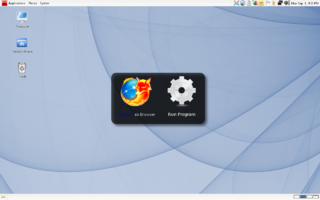 W
WKatapult is a free application launcher for the TDE desktop environment. Original development ceased in 2008, but it's been maintained by the TDE developers ever since.
 W
WKBFX is an application written in C++/Qt for KDE 3.2+ and offers an alternative to the default K Logo menu.
 W
WKDE Frameworks is a collection of libraries and software frameworks readily available to any Qt-based software stacks or applications on multiple operating systems. Featuring frequently needed functionality solutions like hardware integration, file format support, additional graphical control elements, plotting functions, spell checking the collection serves as technological foundation for KDE Plasma 5 and KDE Applications distributed under the GNU Lesser General Public License (LGPL).
 W
WKDE Plasma 4 was the fourth generation of the KDE workspace environments. It consisted of three workspaces, each targeting a certain platform: Plasma Desktop for traditional desktop PCs and notebooks, Plasma Netbook for netbooks, and Plasma Active for tablet PCs and similar devices.
 W
WKDE Platform 4 was a collection of libraries and software frameworks by KDE that served as technological foundation for KDE Software Compilation 4 distributed under the GNU Lesser General Public License (LGPL). KDE Platform 4 was the successor to KDElibs and the predecessor of KDE Frameworks. KDE Platform 4 is the only version of KDE Platform, see KDE’s brand repositioning.
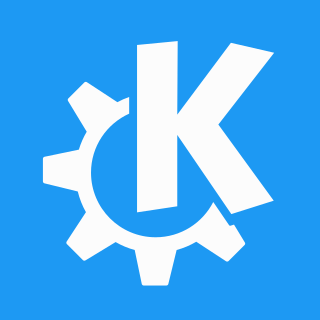 W
WKDE Projects are projects maintained by the KDE community, a group of people developing and advocating free software for everyday use, for example KDE Plasma and KDE Frameworks or applications such as Amarok, Krita or Digikam. There are also non-coding projects like designing the Breeze desktop theme and iconset, which is coordinated by KDE's VisualDesignGroup. Even non-Qt applications like GCompris, which started as a GTK-based application, or web-based projects like WikiToLearn are officially part of KDE.
 W
WThe KDE Software Compilation was an umbrella term for the desktop environment plus a range of included applications produced by KDE. From its 1.0 release in July 1998 until the release of version 4.4 in February 2010, the Software Compilation was simply known as KDE, which stood for K Desktop Environment until the rebrand. The then called KDE SC was used from 4.4 onward until the final release 4.14 in July 2014. It consisted of the KDE Plasma 4 desktop and those KDE applications, whose development teams chose to follow the Software Compilation's release schedule. After that, the KDE SC was split into three separate product entities: KDE Plasma, KDE Frameworks and KDE Applications, each with their own independent release schedules.
 W
WKDesktop is the component of the K Desktop Environment 3 and earlier, which provides a virtual background window to draw icons or other graphics on. In conjunction with Kicker and SuperKaramba, it constitutes the graphical shell.
 W
WKGeography is a Free and open source educational software game that tests students geographical knowledge. It forms part of KDE SC 4. Current version ships with KDE Education Project 3.5.
 W
WKHangMan is an educational computer game designed for young children based on the classic Hangman game. It is part of the KDE Software Compilation, specifically, in the kdeedu package.
 W
WKicker is the main panel used in K Desktop Environment 3 and earlier. Together with KDesktop, it forms the graphical shell. It can be customized by the user. By default, it has the K Menu, a Desktop Access button, a Home button, a Konqueror button, a Kontact button, and a Help button. It also has the Desktop Preview & Pager, the Taskbar, the System Tray, and the Clock.
 W
WKig is free and open-source interactive geometry software, which is part of the KDE Education Project. It has some facilities for scripting in Python, as well as the creating macros from existing constructions.
 W
WKiten is a Japanese Kanji learning tool and reference for the KDE Software Compilation, specifically, in the kdeedu package. It also works as a Japanese-to-English and English-to-Japanese dictionary. The user can input words into a search box, and all related Kanji are returned with their meaning and part of speech. Kanji can be filtered by rarity and part of speech. A list of Kanji is also available which sorts characters by grade level and stroke number. Selecting one shows its Onyomi, Kunyomi, and meanings. Users can also add Kanji to their "learn list" and get simple flashcard quizzes where the Kanji is displayed along with possible meanings to choose from.
 W
WKPackage was KDE's package manager frontend.
 W
WKRename is a KDE software that can be used for renaming multiple files and directories at one time. Many Linux distributions that use Plasma as the default desktop environment include the KRename software.
 W
WKStars is a freely licensed planetarium program using the KDE Platform. It is available for Linux, BSD, macOS, and Microsoft Windows. A light version of KStars is available for Android devices. It provides an accurate graphical representation of the night sky, from any location on Earth, at any date and time. The display includes up to 100 million stars, 13,000 deep sky objects, constellations from different cultures, all 8 planets, the Sun and Moon, and thousands of comets, asteroids, satellites, and supernovae. It has features to appeal to users of all levels, from informative hypertext articles about astronomy, to robust control of telescopes and CCD cameras, and logging of observations of specific objects.
 W
WKTechLab is an IDE for electronic and PIC microcontroller circuit design and simulation; it is a circuit designer with auto-routing and a simulator of common electronic components and logic elements.
 W
WKTouch is a software application to learn and practice touch typing. It comes with courses for many different keyboard layouts across dozens of languages. KTouch keeps track of the user's progress. If the user completes a lesson well enough the next lesson will be unlocked.
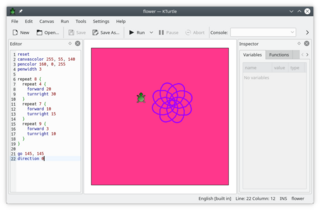 W
WKTurtle is an educational programming environment for turtle graphics. It is released under the open-source GNU General Public License and is part of the KDE Project since KDE3. KTurtle includes an IDE and a programming language which is loosely based on Logo and is intended for teaching programming.
 W
WLabPlot is a free software and cross-platform computer program for interactive scientific graphing and data analysis, written for the KDE desktop. It is similar to Origin and is able to import Origin's data files.
 W
WRosegarden is a free software digital audio workstation program developed for Linux with ALSA and Qt4. It acts as an audio and MIDI sequencer, scorewriter and musical composition and editing tool. It is intended to be a free alternative to such applications as Cubase.
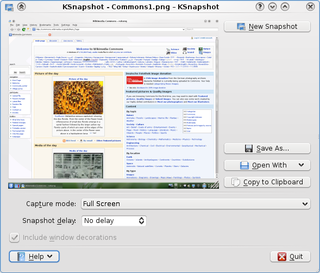 W
WKSnapshot is a screenshot application for the KDE desktop environment developed by Richard J. Moore, Matthias Ettrich and Aaron J. Seigo. The screenshots taken by KSnapshot are also called snapshots, which explains its name. It is written in Qt and C++. KSnapshot allows users to use hotkeys to take a screenshot.
 W
WStep is an open source two-dimensional physics simulation engine that is included in the KDE SC as a part of KDE Education Project. It includes StepCore, a physical simulation library.
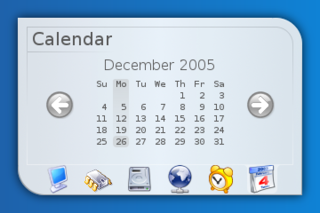 W
WSuperKaramba is a tool, a so-called widget engine, that allows the creation of functionality enhancement modules on the KDE desktop. The desktop widgets are usually embedded directly into the background and do not disturb the normal view of the desktop. The use of SuperKaramba is not limited to KDE, but certain libraries from KDE are required. SuperKaramba had been included in KDE since version 3.5. SuperKaramba is similar to gDesklets for GNOME. The name derives from Portuguese and Spanish super caramba, meaning approximately "super wow" or "super cool".
 W
WTaskJuggler is GPL-licensed project management software that runs under the Linux and Unix operating systems and is programmed in C++ using the Qt toolkit and KDE libraries. The TaskJuggler Project was started in 2001 by Chris Schläger. Early releases provided a command line tool that generated HTML reports. From August 2005 to July 2010, the package also provided a graphical user interface based on the KDE libraries.
 W
WTellico is a KDE application for organizing various collections. It provides default templates for example for books, bibliographies, videos, music, video games, coins, stamps, trading cards, comic books, and wines. For custom collections data models are freely modifiable. Data can be entered manually or by downloading data from various Internet sources. Even though Tellico has default template also for data-files it has no jukebox or mediacenter like features.
 W
WTrojitá is a free software IMAP and SMTP email client developed using the Qt C++ library. The design goals of the maintainers are to develop a fast e-mail client which respects open standards, is cross-platform and uses the available resources very efficiently.
 W
WTwinkle is a free and open-source app for voice communications over Voice over IP (VoIP) protocol. It is designed for Linux operating systems and uses the Qt toolkit for its graphical user interface. For call signaling it employs the Session Initiation Protocol (SIP). It also features direct IP-to-IP calls. Media streams are transmitted via the Real-time Transport Protocol (RTP) which may be encrypted with the Secure Real-time Transport Protocol (SRTP) and the ZRTP security protocols.